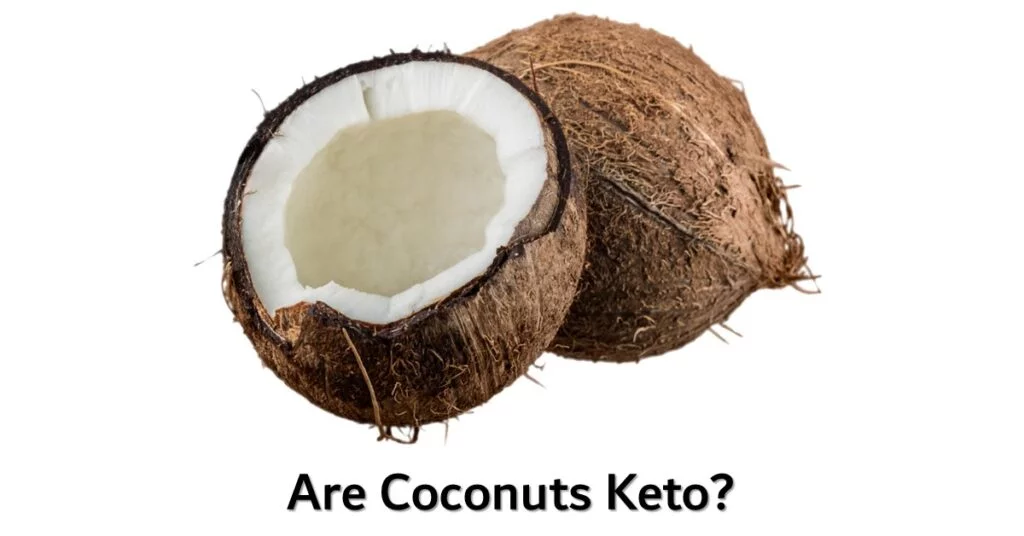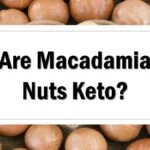Fruits That You Can Eat On The Keto Diet
There are a number of fruits that you can eat on a keto diet. Some people get confused, and think that you cannot eat any fruit on a keto diet.
This is not the case.
Some fruits are lower in sugars than others, this means that they are keto approved, in moderation.
We’ve listed some of our favorites below for you.
- Coconut [2.85 grams / 1 medium piece]
- Lemons [3.81 grams / 1 medium piece]
- Guavas [4.88 grams / 1 medium piece]
- Cantaloupe Melon [5.03 grams / 1 wedge serving]
- Limes [5.16 grams / 1 medium piece]
- Blackberries [6.24 grams / 1 cup serving]
- Boysenberries [6.24 grams / 1 cup serving]
- Youngberries [6.24 grams / 1 cup serving]
- Raspberries [6.69 grams / 1 cup serving]
- Cranberries [8.32 grams / 1 cup serving]
- Berries [8.49 grams / 1 cup serving]
- Strawberries [8.67 grams / 1 cup serving]
- Cherries [9.49 grams / 10 pieces]
- Oheloberries [9.58 grams / 1 cup serving]
- Red Sour Cherries [10.95 grams / I cup]
- Blueberries [17.51 grams / 1 cup serving]
Fruits can be a great source of fiber on keto. However, it’s essential that you remember to portion out fruits on keto to ensure that you do not overeat them.
The net carbs in fruits can soon add up and put you over your daily carb limit.
Fruits That You Cannot Eat On The Keto Diet
Fruits that are likely to sabotage your keto journey have been listed below. These should be avoided on a keto diet.
Not eating fruits on a keto diet can seem counter intuitive after years of being told they are great for weight loss.
Below is a list of fruits that you should avoid on the keto diet, including their net carb count. This includes some canned fruits and variations on the original.
List Of Fruits To Avoid On Keto
- Grapes [0.41 grams / 1 medium piece]
- Plums [6.64 grams / 1 medium piece]
- Peaches [7.85 grams / 1 medium piece]
- Figs [8.19 grams / 1 medium]
- Pineapples [9.41 grams / 1 medium piece]
- Tangerines [9.71 grams / 1 medium piece]
- Dried Fig [10.24 grams / 1 piece serving]
- Honeydew Melon [10.36 grams / 1 wedge serving]
- Loganberries [11.15 grams / 1 cup serving]
- Mulberries [11.32 grams / 1 cup serving]
- Canned Apricots in Water [11.63 grams / 1 cup serving]
- Peaches in Water Pack [11.71 grams / 1 cup serving]
- Nectarines [12.05 grams / 1 medium piece]
- Oranges [12.29 grams / 1 medium piece]
- Raisin Sauce [13.31 grams / 1/4 cup]
- Litchis [14.67 grams / 10 pieces]
- Apricots [15.05 grams / 1 cup sliced]
- Canned Mandarin Oranges (Drained) [15.48 grams / 1 cup serving]
- Apples [15.76 grams / 1 medium piece]
- Grapefruit [17.88 grams / 1 medium piece]
- Red Sour Cherries in Water Pack [19.11 grams / 1 cup serving]
- Watermelon [20.49 grams / 1 wedge serving]
- Pears [20.56 grams / 1 medium piece]
- Chinese Gooseberries (Kiwi Fruit) [20.65 grams / 1 cup serving]
- Bananas [23.85 grams / 1 medium piece]
- Papayas [24.32 grams / 1 medium piece]
- Peaches in Extra Light Syrup [24.92 grams / 1 cup serving]
- Sweet Cherries in Water Pack [25.46 grams / 1 cup pitted serving]
- Canned Apricots in Juice [26.21 grams / 1 cup serving]
- Canned Apricots in Extra Light Syrup [26.88 grams / 1 cup serving]
- Rasins [27.4 grams / 1/4 cup]
- Milk Chocolate Coated Raisins [28.84 grams / 1/4 cup]
- Figs in Water Pack [29.2 grams / 1 cup serving]
- Seeded Raisins [29.57 grams / 1/4 cup]
- Seedless Golden Raisins [31.2 grams / 1/4 cup]
- Carob Covered Raisins [31.25 grams / 1/4 cup]
- Chocolate Covered Raisins [31.37 grams / 1/4 cup]
- Mangos [31.49 grams / 1 medium piece]
- Peaches in Light Syrup Pack [33.22 grams / 1 cup serving]
- Fruit Cocktail in Light Syrup [33.73 grams / 1 cup serving]
- Yogurt Covered Raisins [33.75 grams / 1/4 cup]
- Fruit Salad in Light Syrup [35.65 grams / 1 cup serving]
- Canned Apricots in Light Syrup [37.72 grams / 1 cup serving]
- Mandarin Oranges in Light Syrup Pack [39 grams / 1 cup serving]
- Canned Mandarin Oranges [39 grams / 1 cup serving]
- Sweet Cherries in Light Syrup [39.77 grams / 1 cup pitted serving]
- Figs in Light Syrup [40.73 grams / 1 cup serving]
- Spiced Peaches in Heavy Syrup Pack [45.49 grams / 1 cup serving]
- Red Sour Cherries in Light Syrup [46.64 grams / 1 cup serving]
- Peaches in Heavy Syrup Pack [48.84 grams / 1 cup serving]
- Sweet Cherries in Heavy Syrup [50.01 grams / 1 cup pitted serving]
- Canned Apricots in Heavy Syrup [51.29 grams / 1 cup serving]
- Frozen Sweet Cherries [52.51 grams / 1 cup pitted serving]
- Figs in Heavy Syrup [53.61 grams / 1 cup serving]
- Frozen Sweetened Apricots [55.44 grams / 1 cup serving]
- Frozen Sliced Peaches Sweetened [55.45 grams / 1 cup serving]
- Red Sour Cherries in Heavy Syrup [56.77 grams / 1 cup serving]
- Sweet Cherries in Extra Heavy Syrup [64.56 grams / 1 cup pitted serving]
- Peaches in Extra Heavy Syrup Pack [65.68 grams / 1 cup serving]
- Figs in Extra Heavy Syrup [72.71 grams / 1 cup serving]
- Red Sour Cherries in Extra Heavy Syrup [74.19 grams / 1 cup serving]
- Dried Fruit Mixture [78.04 grams / 1 cup serving]
- Stewed Apricots [81.22 grams / 1 cup serving]
- Stewed Peaches [82.62 grams / 1 cup serving]
- Dried Cranberries [84.3 grams / 1 cup serving]
- Dried Peaches [85.03 grams / 1 cup serving]
*nutritional values take from FactSecrets.
This is by no means an exhaustive list; it is designed to give you an indication of which fruits to avoid.
Why Are Fruits Such a Contentious Issue?
After years of trying a low calorie diet, I was used to fruit being an all you can eat buffet. However, this is different for a keto diet, foods need to fit into your macros.
Fruits contain fructose, which is a sugar with a GI of 23.
The Glycemic Index (GI) is a way of rating carbohydrates. All sugars are carbohydrates.
The GI is rated from 0-100. In simple terms, it measures how quickly a food will affect your blood sugar(glucose) levels when you eat that food, or in the case of sugars, normally a food that contains the sugar.
A GI of 23 is higher than we would normally like on a keto diet, which is why some fruits should be avoided, and others can be eaten in moderation.
If you have been living a keto diet for any time, you will likely know that one of the main aims is to regulate your blood sugar levels.
It is the spiking up of blood sugar levels that leads to that euphoric feeling, followed by a feeling of hunger, which makes you want to eat more.
That’s why not long after eating an apple you feel hungry again. You will it the apple, your blood sugar will spike, which will make you feel good, and then it will drop, which will leave you craving more food/sugar.
It is by controlling these blood sugar levels which prevents cravings for further sugary foods.
Foods scoring zero, or as close to zero as possible, will not spike your blood sugar levels.
These foods are broken down more slowly. Foods that are closer to the higher end of the GI are broken down quickly in the body causing a rapid increase in blood glucose levels.
It is for this reason that sugars are limited on the keto diet, if not your blood sugar levels would constantly be yo-yo-ing, which is really hard to control.
This is not healthy for anybody. More importantly, it will make it very difficult for your body to remain in a state of ketosis.
If you are interested in finding out more about keto sugars, check out our ultimate guide to keto friendly sugars, which will take you through everything you need to know.
If some of these terms and abbreviations have been confusing, we have guides available for you.
If the ketogenic diet in its own right is confusing, check out our keto 101 guide, which will take you through everything you need to know to get started on your keto journey.
Wrapping Up: Are coconut keto friendly?
In summary, yes, you can eat coconuts on a keto diet. However, In order to remain in ketosis, it is essential that fruits are eaten in moderation.
What are your favorite fruits to enjoy on a keto diet? Let us know in the comments below.
Are coconuts keto friendly? Can I eat Coconuts on Keto? Here, we will answer all of your questions keto coconut, including how many net carbs are in coconuts, what an average serving size is, and overall whether Coconuts are keto approved. [SPOILER ALERT: Yes, Coconuts are keto-friendly.] Just remember to be careful as to how many you eat so as to not go over your carb allowance.
Disclosure: Some of the links in this article may be affiliate links, meaning that we may earn a small commission if you click through using our link and make a purchase. Please be assured that this will not cost you any extra money. Also, please be assured that we either use the products we recommend personally, or have been recommended by trusted friends who currently use them.
Read on to find out more, including the BEST low carb, high-fat nuts, and seeds to eat on keto.
Nuts and seeds can be a great snack, whether you’re busy on the go with the children, whether you need a snack to take to the movies, or you need something to get you through a busy day at work as you bounce from meeting to meeting.

Life is busy enough for all of us without then having to consider self-care.
Yes, good nutrition and fuelling your body with what it needs is self-care.
We need to look after our bodies, in order for our bodies to look after us.
Nuts and seeds can be a great way to get key nutrients into your diet so you can avoid having to take supplements. What is more is that they are a great source of healthy fats, which will help you reach your keto macros.
However, what you have to be mindful of, is that some nuts and seeds are higher in carbs than others. So, a serving of one type may have up to 5x the number of carbs as a serving of a different type.
Let’s get into it, and find out, are coconuts keto friendly?
Nutritional Value Of Coconuts
When examining one serving of coconuts, the nutritional value is as follows:
- Carbohydrates: 6.8499999999999996 grams
- Fiber: 4 grams
- Fat: 15.07 grams
- Sugars: 2.7999999999999998 grams
- Protein: 1.5 grams
- Calories: 159 calories
Now we know the nutritional value of coconuts, let’s have a look at how many net carbs that equates to.
How Many Net Carbs In Coconuts
Coconutshave 2.85 grams of net carbs.
Net carbs are calculated by deducting the total amount of fiber (4 grams) from the total number of carbs (6.8499999999999996 grams), giving us the total number of net carbs of coconuts: 2.85 grams.
Eating 100g of any nut or seed would be a lot in one go.
So, What Is The Average Serving Size Of Coconuts
The average serving size of a portion of coconuts is 45 grams or 1/4 cup, 1.5 oz, depending on whether you are working in imperial or metric.
This means that there are 2.7 NET carbs per serving of coconuts.
Are Coconuts Keto Friendly?
Yes, coconuts are keto friendly. They are low in carbs and high in good fats. Perfect for a keto diet.
Just remember to be careful as to how many you eat so as to not go over your carb allowance
A Bit Of Info Around Coconuts
If you are interested in finding out more about the foods that you are eating. You may be interested in the below about coconuts.
Coconut comes from the coconut tree.
These are mainly grown by small-scale farmers in tropical coastal areas, such as Samoa and Fiji, as well as in the tropics, such as Thailand, India, the Philippines, and Indonesia.
Interestingly, a coconut is classified as a fruit, a nut, and a seed – pretty impressive eh?!
Coconut can be used in baking, as well as in a number of Middle Eastern dishes.
Top Tips For Eating Coconuts on Keto
As we have noted above, it can be easy to overeat nuts and seeds on keto. Eating too many carbs on keto can be one of the reasons that you may end up with a keto stall, for most, this is something that you will want to avoid.
There are some other things that you need to look out for too.
To help you out, we have drawn together some of our top tips for eating nuts and seeds on keto.
- Only buy plain nuts, some are sold with flavors or added sugars that are not keto friendly. Stay clear of these as they may knock you out of ketosis and ruin your keto goals. This does not mean that you cannot ‘jazz’ up your plain nuts with keto approved sweeteners or flavors. Check out our article on homemade paprika almonds, great for tapas or just as a snack.
- Nuts and seeds can be expensive, but if bought in bulk you can normally save a lot of money. If you are doing keto on a budget, saving money wherever you can is essential.
- When you buy your nuts or seeds, weigh them out into individual portion sizes. Store them in an airtight container.
- Nuts and seeds can be easy to overeat. This will mean that you may be inadvertently eating to many carbs for your macros. Portioning them out will stop you from overeating them. What’s more, by portioning out your nuts or seeds in advance, they are quick to grab on the go. This can be particularly useful if you are planning on drinking alcohol and may not have the willpower that you would normally.
If you are new to keto, our keto beginners guide may be an interesting read for you. Or, if any of the terminologies has been confusing, we’ve got our keto terms guide, and keto abbreviations guide, which may be of use to you.
Keto Recipes With Nuts & Seeds
There are plenty of amazing keto recipes that contain nuts or seeds, they do not have to be something that you are afraid of eating on a keto diet. Almond flour and coconut flours are two of the main ‘regular’ flour substitutes used in keto baking.
For some of our favorites, check out these articles
Which Are The Best Nuts & Seeds For Keto?
The best nuts to eat on keto, in terms of having the lowest number of net carbs per serving are as follows;
The best seeds to add to your keto salads or keto cooking are;
Wrapping Up: Are Coconuts Keto Friendly?
In summary, yes, coconuts are keto friendly. Just remember to be careful as to how many you eat so as to not go over your carb allowance.
What are your favorite nuts and seeds to eat on keto?
Do you have any particularly innovative ways to use these?
Let us know in the comments below in order to share your top tips with the whole community.


